Review: Molière's medical satire gets lost in a carnival

The University of Michigan production of Molière's The Imaginary Invalid is giddy, bawdy, extremely noisy, and intermittently funny.
Translator James Magruder sought to recreate the theatrical carnival that would have surrounded and interrupted Molière's play when it was first produced in 1673, but in the process Molière's satire takes a back seat and a beating. Director Daniel Cantor takes Magruder's ideas and adds on some of his own. Molière is a mix of pratfalls and comic repartee but the physical action here is often aimless and drags on and the verbal wit is often lost in the noise.
The production seems less like a carnival than a mishmash of Ionesco and Beckett, fart jokes raised to art by Aristophanes and beloved by 12-year-olds everywhere, English music hall and French chanteuses and even a Saturday Night Live skit.
The set design by Vincent Mountain seems to borrow a bit from Chaplin's factory scene in Modern Times or maybe from Fritz Lang's Metropolis as a way to emphasize constant motion, and every once in a while explodes in bubbles. The costumes are not time specific and range from Molière's day to the early 20th Century. The Entr'acte Company wear form fitting suits that would work just as well in a Star Trek play.
The high point of the production is one of the interludes developed by Cantor and the company. The comedy here is quick-footed, makes good use of modern day references, and cheerfully involves the audience. A talented actor named Caleb Foote delivers the goods, dressed as part clown, part busker serenading his beloved. Foote knows how to grab an audience and hold them for dear life. He makes the best of the free form material with a good singing voice and lively banter.
The cast of the central play is fine. Jesse Aaronson gets to ham it up as Argan, the titled imaginary invalid. He moans, groans, and makes body noises as an insufferable hypochondriac. Argan does battle with his impertinent servant Toinette, played with proper spunk and fire by Kay Kelley. Savannah Crosby plays Argan's older daughter, whom he tries to marry off to a doctor's son so he can be under constant care. She plays the daughter as a pretty 19th Century melodrama maid with a bit of a twinkle.
Also notable are Delaney Moro as Argan's second wife, who plots to take his fortune and sneers appropriately; Brendan Alpiner as the unappealing suitor who reels out memorized spiels of twisted flattery; and Anna Markowitz as the younger daughter, who jostles amusingly with her father, verbally and physically.
But the acrobatics, anachronisms, noise, and busyness drown out the satire that still has some power in our times of medical disasters and cure all fads. A last bit of SNL comedy in the finale makes reference to the presidential campaign at a time when that campaign has turned into dangerous high comedy itself.
Hugh Gallagher has written theater and film reviews over a 40-year newspaper career and was most recently managing editor of the Observer & Eccentric Newspapers in suburban Detroit.
The Imaginary Invalid continues April 2, 8, and 9 at 8 pm, April 3 and 10 at 2 pm, and April 7 at 7:30 p.m. at the Arthur Miller Theatre on the UM North Campus. Tickets are available 9 am to 5 pm at the League Ticket Office within the Michigan League. Order by phone at (734)764-2538.
Preview: Threads All Arts Festival - April 1-2

The Threads All Arts Festival is a new cross-disciplinary arts festival that’ll take place in the Yellow Barn in Ann Arbor on April 1-2, 2016. It’s two days packed with music, dance, poetry, film, theater, and visual art, and the two-day pass to the festival costs $5.
The festival came together after six students at the University of Michigan School of Music, Theatre, and Dance thought up the idea, and then U-M’s EXCEL program funded the project.
Launched in September 2015, EXCEL stands for Excellence in Entrepreneurship, Career Empowerment. Jonathan Kuuskoski, Assistant Director of Entrepreneurship and Career Services at U-M SMTD, says that the goal of the program is to catalyze success for all of U-M SMTD students and alumni through curricular and co-curricular programming and ongoing mentorship. The Threads festival is one of twelve projects funded by the Performing Arts EXCELerator program.
Kuuskoski says he’s proud of the work that the Threads team has done so far. He says the project was selected and funded at the highest level because it is “a very audacious idea, but one that seemed to be rooted in a very present community need.”
I met Meri Bobber, one of the students on the Threads team, through my work as the manager of digital media at the University Musical Society - you'll catch several UMS Artists in Residence participating in the festival.
Through Bobber, I connected with the full Threads team (Nicole Patrick, Meri Bobber, Sam Schaefer, Peter Littlejohn, Lang DeLancey, and Karen Toomasian) to chat about what’s exciting about the project and what we can expect in the future.
Q: How did the festival first come together?
A: Sam and Nicole were sitting together dreaming of attending the Eaux Claires festival in Wisconsin. They realized that if they were dreaming this hard about attending, they should also probably put together their own festival. At first it was a joke, but then they won a grant. The festival had to happen.
Sam and Nicole quickly realized the festival was in no way possible with just the two of them, and they reached out to four people that seemed to fill every role possible. This team has been digging deep to put together the Threads Festival. We have all helped each other develop ideas, compromise on our way-too-ridiculous ambitions, and organize an event that represents the amazing, unique town that is Ann Arbor.
Q: You talk about how it’s important to you that both students and Ann Arbor community participate. Why is this important to you?
A: The purpose of all of our work is to make something great for Ann Arbor. Ann Arbor, in its awesome uniqueness, is not JUST a college town and not JUST a little city. Its special blend of communities, artistic and otherwise, is what makes it different from any other place in the world. To celebrate the city’s whole artistic community through this festival, we strive to bring students and non-students together.
Q: What are you most looking forward to at the festival?
A: WE CAN HARDLY WAIT FOR ALL OF IT. We are looking forward to seeing all of the tiny pieces that we have thought about as independent or abstract come together into one coherent thing. We can't wait to feel the sense of unity and action that we hope this festival will create. We’ll consider this year a success if people walk out smiling, or rather, thinking. We're such dorks about everything...we were stoked to order porta-potties. It's just amazing. All of it.
Q: You’re aiming to make this an annual festival. That’s an ambitious goal. What do you hope for the festival in the coming years?
A: We want Threads to help expose budding artists in this area. They are working their butts off, but in a town where there are (thankfully) a ton of live performances, many don’t have a large turnout. Simply put, we want people to look forward to this festival as a way to discover artists, so that they can look for these artists around town and see/hear/interact with them beyond just this one day.
We would also love to find a way for the festival to feature a larger outdoor presence in the future. We want guests to be able to leave behind the distractions of daily life, and experience a multi-stage festival event for a few days in an open and peaceful outdoor environment where the music and the river, or wind, or even the sound of crickets can exist in a way that allows a unique experience to emerge.
We want this festival to find longevity far beyond this season so that there is just one more GREAT thing about Ann Arbor.
Anna Prushinskaya is a writer based in Ann Arbor, Michigan.
The Threads All Arts Festival is takes place in the Yellow Barn in Ann Arbor on April 1-2, 2016.
Preview: The University Opera Theatre presents Così Fan Tutte

A wager that women can’t be faithful and a bold experiment (with elaborate disguises to prove that point) form the plot foundations of Mozart’s famous comic opera Così Fan Tutte, to be performed by University Opera Theatre accompanied by the University Philharmonia Orchestra.
Deemed scandalous on its premiere, the opera had a troubled production history. Commissioned for the 1789-90 season, Così Fan Tutte received only five performances before the 1790 death of Emperor Joseph II. The new emperor did not hold the same cultural views as his predecessor and the new comic opera received only five more performances. It is rumored that Mozart, who died the following year, never even received full payment for his authorship.
Today’s audiences find this opera comical, yet touching. The complex plot (featuring mixed identities, declarations of love, and fiancée-swapping as two young men don disguises to woo their own girlfriends) is no longer scandalous but extremely amusing. The magnificent score includes such beautiful arias as “Come scoglio,” “Smanie implacabili,” and “Per pieta.”
Directed by Kay Walker Castaldo and conducted by Kathleen Kelly, the U-M production will be sung in Italian with projected English translations.
Tim Grimes is manager of Community Relations & Marketing at the Ann Arbor District Library and co-founder of Redbud Productions.
Performances run from Thursday, March 24 to Sunday, March 27 at Lydia Mendelssohn Theatre, 911 N University Ave, Ann Arbor. For tickets, visit http://tickets.music.umich.edu or call the Michigan League at (734) 764-2538.
Preview: Rise Up Cabaret, Neighborhood Theatre Group

There's a brand-new theatre group in the area. Founded by Kristin Anne Danko and Aaron Dean, who recently relocated to the area from Chicago’s experimental theatre scene, Neighborhood Theatre Group is based on the belief that theatre can bring individuals together.
The company, based in Ypsilanti, intends to cultivate a welcoming and collaborative environment for local theatre artists and has assembled a talented group of singers and performers for their March production, Rise Up Cabaret. Featuring songs of many different genres and styles all centered on the theme of rising up, this musical evening shines a bright, positive light on current, difficult, and important social issues.
Directed by Kristin Anne Danko, Rise Up Cabaret features Nick Brown, David Galido, Eric Hohnke, Emily Rogers, Mary Rumman, Angela Tomaszycki, Craig VanKempen, and Kelly Rose Voigt, with Tom Hett on piano.
Neighborhood Theatre Group has also partnered with Ypsilanti’s Ozone House for this production, and representatives from the organization will attend each performance with information on Ozone House and its mission.
So, why not try something new? Neighborhood Theatre Group promises a memorable musical evening filled with uplifting songs. Local audiences can also look forward to future Neighborhood Theatre Group productions including original works, sketch shows, cabarets, and self-produced videos.
Tim Grimes is manager of Community Relations & Marketing at the Ann Arbor District Library and co-founder of Redbud Productions.
Rise Up Cabaret runs from Thursday March 24th through Saturday March 26th at Dreamland Theater, 26 N. Washington St. in Downtown Ypsilanti. All shows are at 8 pm. To reserve seats, or for more information, email neighborhoodtheatregroup@gmail.com.
Preview: Charley's Aunt, Skyline High School
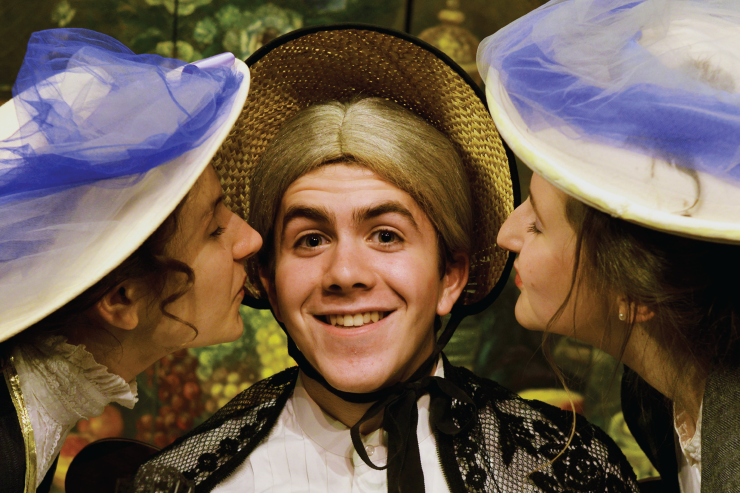
This weekend, Skyline High School Theatre presents Charley's Aunt.
Long before Tootsie or Mrs. Doubtfire - 122 years ago, in fact - the cross-dressing comedy Charley’s Aunt has been keeping audiences in stitches. Playwright Brandon Thomas wrote this British farce about a couple college buddies who rope a third friend into dressing up as an elderly aunt/chaperone for their girlfriends. They hope “she” will be a more reasonable alternative to the girls’ over-protective and overbearing male guardian...but of course it turns out to be a little more complicated than that.
“Charley's Aunt is the quintessential British farce,” says director Anne-Marie Roberts, explaining that the show isn’t just entertaining for the audience, it’s also educational for the participants. “Exposing the students to a gem of the British theater is one of the goals for educational theater.”
Skyline's production features Jianmarco Barbeau and Jakub Hann as the college friends; Leah Bauer and Amanda Wilhoit as the girlfriends; Riley O'Brian as the guardian; and Theo Billups as "Charley's Aunt". Rounding out the cast are Peter Dannug as Sir Fancis; Madison Burk as wealthy widow Donna Lucia De Alvadorez; Sonja Mittlestat as her young ward Ela; and Luke Wertenberger as Jack's put-upon butler, Brasset.
Amy Cantú is a Production Librarian at the Ann Arbor District Library.
Charley’s Aunt runs March 17,18, and 19 at Skyline High School Auditorium at 7:30 pm each night. Tickets are available at www.showtix4u.com for $8 for adults and $6 for students and seniors. Tickets will also be available at the door for $10 for adults and $8 for students and seniors.
Preview: Warren's Peace, Saline Area Players
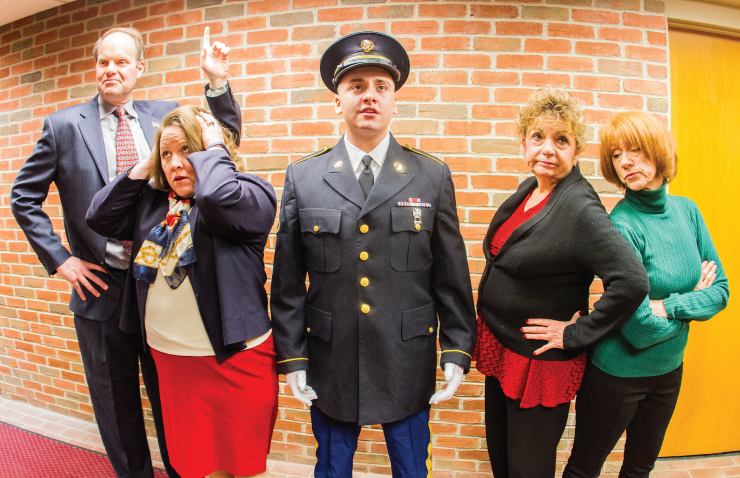
Enjoy an evening of theater set in Michigan, written by Michigan playwrights--that also promises audience samples of Michigan-made treats from local providers like Ed's Bread, Grand Traverse Pie, and Zingerman's--when the Saline Area Players present Marc and Kathy Holland’s new comedy Warren’s Peace.
The production may seem to be an appreciation of all things Michigan, but the underlying purpose is to delight and amuse. As playwright and director Marc Holland stated in a recent interview “I want you to have a good time when you attend my show, just as I want to laugh when I lay down my money at the box office.”
Warren’s Peace centers on a national guardsman who is sent to a small Michigan town to kick off World Peace Day, but runs into conflict when he meets the distrustful, eccentric townspeople. Andrew Godell plays the guardsman, and the cast includes Brent Lofgren, Trevor Maher, Patti Ringe, Marlena Shuler, and (of special interest to library fans) Laurie Atwood as the Librarian.
Tim Grimes is manager of Community Relations & Marketing at the Ann Arbor District Library and co-founder of Redbud Productions.
Performances of Warren’s Peace run Thursday-Saturday, March 17-19, and will take place at Fifth Corner, 211 Willis Rd in Saline. For information, visit http://salineareaplayers.org.
Review: Civic Theatre embraces the absurd in 'Rosencrantz and Guildenstern'
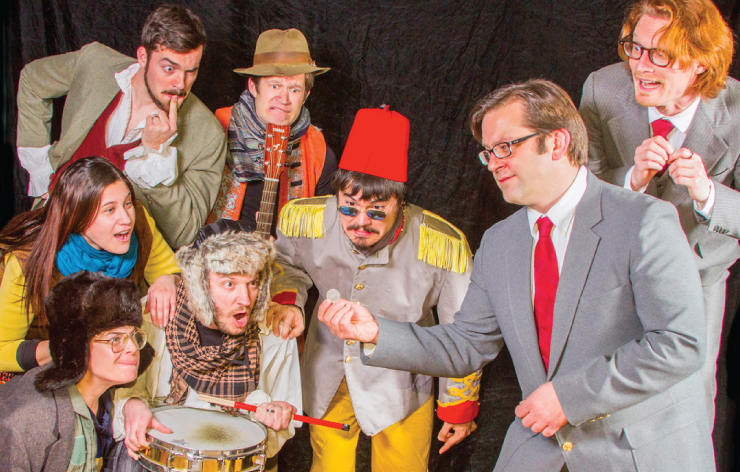
Rosencrantz and Guildenstern--or is it Guildenstern and Rosencrantz? No matter, even they have trouble knowing who's who.
The Ann Arbor Civic Theatre takes on Tom Stoppard's absurdist comedy Rosencrantz and Guildenstern Are Dead with good humor and a respect for Stoppard's more serious intentions.
Rosencrantz and Guildenstern are two minor characters in Shakespeare's Hamlet, friends from his youth who become minor pawns in Hamlet's battle with his Uncle Claudius. Stoppard imagines the agony of the bit player, waiting his moments on the stage and always a little clueless as to what his role is about or why it matters. The play borrows knowingly not only from Hamlet but also from Samuel Beckett's Waiting for Godot. The theme applies, of course, not just to actors but to all of us who imagine we are but bit players in someone else's story.
As the play begins, the two are endlessly flipping coins and discussing probability. Guildenstern is the verbose one. James Ingagiola saunters about the stage discussing all the important questions of journalists and philosophers: who, what, where, when, and why. Guildenstern is never sure about anything and always hesitates a bit too long. Ingagiola is a humorously pompous Hardy to Isaac Ellis' twittery Laurel as Rosencrantz.
Rosencrantz is a nervous but playful man, who enjoys a good game of coin flipping or anything else that is suggested. He's malleable and a bit slow on the uptake. Isaac's face is constantly mugging awe, fear, childish delight, or childish terror. His voice also rises higher as his confusion grows.
These two amiable clowns have a hard time remembering who they are, why they're in Elsinore, and exactly what they have to do with the actions around them. They are constantly reminding each other of how it all began and what it is that they are supposed to do.
As they wait, a whole gaggle of bit players arrive, the Tragedians, the players hired by Hamlet to expose his uncle's guilt in the murder of his father.
Joseph McDonald is boldly expressive as The Player, the group's leader with a taste for blood and vulgarity. He tries to explain how theater works to the bewildered Rosencrantz and Guildenstern. He does so by having his players display those elements of theater that the audience expects, like a good death well played. The players are a boisterous crew who give it their all.
The player who gets the most attention is the lovely Alfred, who plays the female roles. Daniel Bizer-Cox has fun sashaying about the stage in stockings and diaphanous clothes and, yet, he never over plays it.
Through this fog, the story of Hamlet runs on, off stage somewhere, until it's time for our two heroes to do their small part and then return to existential agony. In another gender switch, Hamlet is played handsomely by a woman, Suzy Culbertson.
David Widmayer makes his directorial debut at the Civic, and he's chosen a difficult play. Absurdist comedy is not for everyone. Tedium is one of Stoppard's themes and the play itself is sometimes tedious as Guildenstern goes on a bit with his musings. Still Widmayer clearly understands the core of this play and has three key actors who deliver on making their absurd characters come to comic life. Some of the Shakespearean scenes might have been played a little more formally and precisely to contrast more sharply with the protagonists' hazy world.
The play's title comes from a line near the end of Hamlet, when Hamlet's fury has left a stage full of dead bodies, worthy of the Player. A message arrives from London that in addition to all this mayhem, "Rosencrantz and Guildenstern are dead." But, of course, the point is that they live on, forever, in Shakespeare and in Stoppard.
Hugh Gallagher has written theater and film reviews over a 40-year newspaper career and was most recently managing editor of the Observer & Eccentric Newspapers in suburban Detroit.
Rosencrantz and Guildenstern Are Dead continues 8 pm Friday-Saturday, March 11-12, and 2 pm Sunday at the Arthur Miller Theatre on the North Campus of the University of Michigan, 1226 Murfin Ave, 48109. Tickets are available online at www.a2ct.org, by calling the office at 734-971-2228, at the A2CT office at 322 W. Ann St., or at the door. Additional information is available by visiting www.a2ct.org.
Preview: Nufonia Must Fall
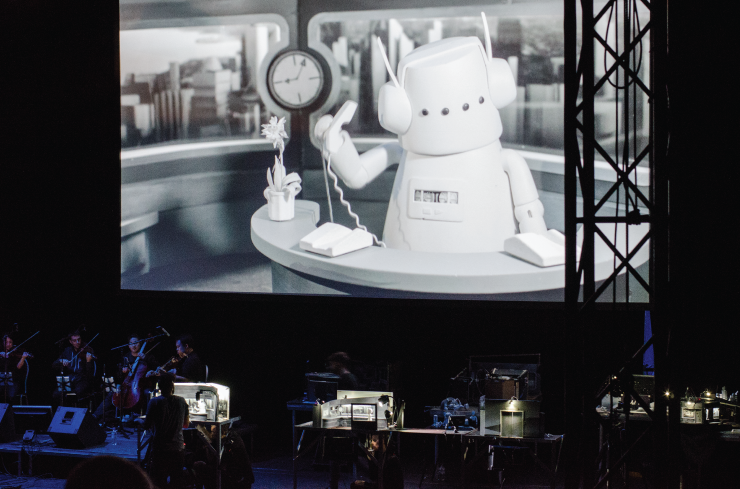
If the combination of puppets, moody robots, and quiet romance – all accompanied by a pop culture-inspired string quartet, moving fluidly from synth to pop to jazz – sounds intriguing and magical, then you need to go see Nufonia Must Fall.
Nufonia Must Fall is based on a nearly-wordless graphic novel published in 2003 by Kid Koala, a D.J., producer, composer, and studio contributor for the band Gorillaz, based in Montreal. As evidenced by his artistic output, Kid Koala, is comfortable in a wildly idiosyncratic, exciting, and whimsical world of raw beats and emotionally-charged stories. Sadly, the graphic novel is out of print, but this live performance uses mixed media to bring the story to life in ways the book alone never could.
The story takes place in Nufonia, a drab, monochromatic place, where T4, a robot, falls in love with a customer at the sandwich shop where he works – after having been fired and replaced by a newer model robot at his old job. The customer reciprocates T4's love and a romance unfolds. The adorable puppets are all white and stand about 10 inches tall. The simple intimacy of the story draws you in and holds you as the highs and lows of their romance play out.
All of the action is projected on a large screen, as the action takes place on a stage of shoebox-sized sets. It’s thrilling to watch the shadowy shapes of the puppeteers create the action in real time – offering up the skin-tingling sensation that only a live performance can evoke.
Kid Koala has said that "Nufonia" is derived from “no fun,” and for those who live there, “what’s going on in their mind gets in the way of having fun.”
Abandon any preconceived notions you may have about puppets, robot love, or marsupial DJs, and come out for a moving and magical evening of unusual storytelling.
Erin Helmrich is a Production Librarian at the Ann Arbor District Library, a fan of the Gorillaz, graphic novels, and adorable stuff in all forms.
"Nufonia Must Fall" runs Friday, March 10 and Saturday, March 11 at 8 pm at The Power Center. The performance is presented by UMS as part of the International Theater Series UMS on Film.
Review: The Chieftains’ UMS Show at Hill Thrills Fans
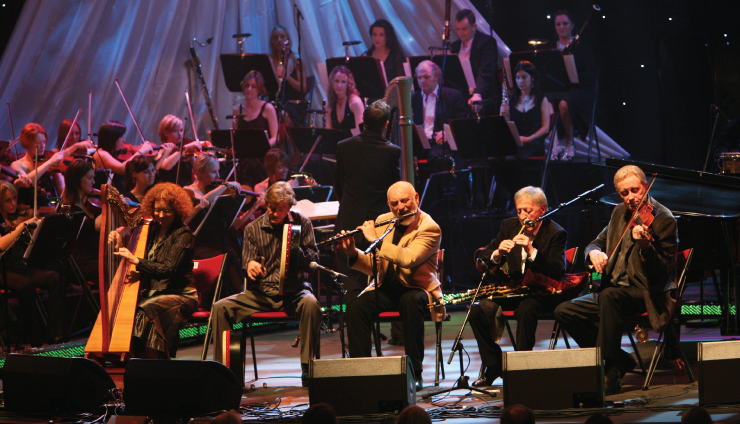
Just a wee bit in advance of St. Patrick’s Day, the University Musical Society brought the Chieftains to Ann Arbor’s Hill Auditorium on Saturday, March 5th. And if this charming, 90-minute show failed to get you in the mood for the holiday, nothing would.
The Chieftains have been torch-bearers, and set the gold standard, for Irish music for more than half a century now. One of the group’s founding members, Paddy Moloney, still sings and plays the pipes and tin whistle at center stage. The band’s current roster also includes Tara Breen (violin, saxophone, dance), Jon Pilatzke (fiddle and stepdance), Kevin Conneff (bodhran and vocals), Matt Molloy (flute), Triona Marshall (harp and piano), and Tim Edey (guitar and accordian), with featured stepdancer Nathan Pilatzke, and featured vocalist and dancer Alyth McCormack.
The Chieftains – perhaps not surprisingly, given their longevity – have a pitch-perfect sense of balancing up-tempo, foot-stomping reels with more delicate numbers. Following a spirited fiddle solo (and dance) by Breen early in the show, Conneff sang “The Flower of Magherally,” largely without any musical accompaniment, letting us focus entirely on the melody and story. Then a quick take on “Cotton Eyed Joe” played out before McCormack appeared on stage to sing the moving ballad, “The Foggy Dew” (previously recorded by the Chieftains with Sinead O’Connor).
With such a vast catalog of music from which to choose, the Chieftains inevitably venture beyond the songs most familiar to fans. Among “new to me” offerings were: the Chinese tune “Full of Joy” (not my favorite, but a clear demonstration of the group’s commitment to sharing not just their own culture’s music); an inspired, gorgeous harp solo, masterfully delivered by Marshall; a song for Nelson Mandela titled, “The Troublemaker’s Jig”; and a musical reading of W. B. Yeats' poem, “Never Give All the Heart.”
But the Chieftains also offered tunes from the documentary television series The Long Journey Home (about Irish migration to the United States), including the American standard “Oh Shenandoah,” accompanied by the Ann Arbor Grail Singers. Indeed, several local groups were integrated into Saturday evening’s show, including Lansing’s Glen Erin Pipe Band (featured most prominently in “San Patricio”), and young students from Plymouth’s O’Hare School of Irish Dance.
This leads me to mention the electrifying role dance played in Saturday’s show. Though Breen was the first to put down her violin, various combinations of dancers performed throughout the show, and the consequence was consistently thrilling.
Most breathtaking of all were the Pilatzke brothers, whose percussive, perfectly synced, wildly complex dances conveyed a palpable sense of joy. I cheered every time they made their way back to the stage’s dance space. Something about their connection to each other amped the energy even higher, and in one instance, as they danced without music, they reminded us that, sometimes, the dance and the music are one and the same.
As the show neared its end, Moloney thanked the crowd and said, “This is one of our very favorite venues,” then played an encore and invited people from the crowd to join in a traveling dance line that moved through the aisles before heading back to the stage. Several fans rushed across their rows to take part, demonstrating the crowd’s unbridled enthusiasm for the show. With everyone’s hands joined, raising and lowering in time together, the moment seemed a wholly fitting conclusion to a night that felt so heartwarming and hopeful.
Jenn McKee is a former staff arts reporter for The Ann Arbor News, where she primarily covered theater and film events, and also wrote general features and occasional articles on books and music.
Preview: Stratford Festival Offers Variety at a Good Exchange Rate
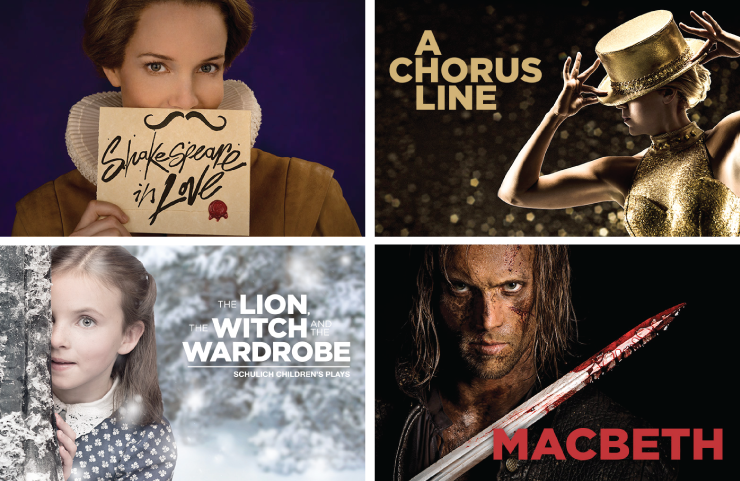
The Stratford Festival, an annual, Canadian theatre festival, is set to begin in April and this year's lineup is typically wide ranging, with 13 plays at four venues.
As always, Shakespeare is the heart of the festival. This year, the Bard is represented with productions of Macbeth, As You Like It and a reworking of Richard II, Henry IV, Part 1 and 2, and Henry V into two plays under the title Breath of Kings. The presentation was conceived and adapted by Stratford veteran Graham Abbey.
Shakespeare, himself, is the lead character in a new stage version of the Oscar-winning film Shakespeare in Love. The comedy sets the young playwright in an Elizabethan setting that is not too different from our own.
The two musicals both have theatrical themes. A Chorus Line is a tribute to modern troupers and Stephen Sondheim's A Little Night Music, an adaptation of Ingmar Bergman's Smiles of a Summer Night, with the hit song "Send in the Clowns."
Every year, Stratford presents a production geared for families. This year it's a stage adaptation of C.S. Lewis's popular fantasy The Lion, the Witch, and the Wardrobe.
Arthur Miller's All My Sons is a modern Shakespearean tragedy of blind betrayal in the story of an airplane manufacturer who cuts corners to save money during World War II.
Other works are Moliere's comedy The Hypochondriac, Henrik Ibsen's John Gabriel Borkman, and the world premiere of two contemporary plays, Aeneid, a modern take on Virgil's epic poem, and a comedy, Bunny.
This is a good year to check out the festival at bargain prices. The value of the Canadian dollar has been falling. Recently the U.S. dollar was worth $1.40 Canadian. That's good news for thrifty theatergoers for tickets, hotel rooms, and restaurants.
The season begins in April and runs through the end of October.
Hugh Gallagher has written theater and film reviews over a 40-year newspaper career and was most recently managing editor of the Observer & Eccentric Newspapers in suburban Detroit.
For more information, check out the Stratford Festival website or call 1-800-567-1600.


































